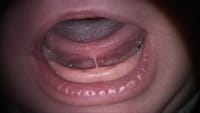Have you heard about newborns who are born with a short frenulum of the tongue (a band of tissue under the tongue), and they can’t stick out their tongue beyond their bottom lip? Alternatively, a very tight lip (or labial) frenulum? This situation isn’t dramatic, but it can cause discomfort.
Given the baby has restricted tongue mobility, it’s difficult to ensure proper latching of the mother’s nipple, which often causes lesions and pain. With a short frenulum of the tongue, the baby must make sustained efforts to hold the nipple and get enough milk by sucking. This can sometimes explain why they tire quickly, they stop sucking. A labial frenulum also hinders the baby from sealing the areola by opening their mouth wide. As a consequence, they will swallow a lot of air, which will lead to gas, reflux and even colic. Over the long-term, this situation can lead to problems for the milk production and weight gain in the newborn, thus the necessity of managing their weight.

In the medical field, a short frenulum called “ankyloglossia.” We consider this condition as a common birth defect (present at birth). According to the Canadian Paediatric Society, no consensus currently exists for criteria to diagnose. However, according to available studies, between 4 and 10% of newborns, and twice the number of boys compared to girls, are afflicted by this. This specific condition seems to have no negative impacts on 2/3 of babies. Additionally, genetic and family predispositions can be found during examinations.
How do you know if you have to cut the band under the tongue or not (frenectomy or frenotomy)?
Each case is different and requires a full examination associated with the potential consequences before suggesting the procedure. At the outset, we have to see if we can first work the breastfeeding position to facilitate latching the breast and increase the baby’s feeding time. A frenectomy is never the first option.
We will first try to :
- Relieve the mother;
- Heal her wounds, if any;
- Support breastfeeding with a variety of positions, taking into consideration the short tongue frenelum;
- Give practical tips to optimize nipple attachment;
- Increase the mother’s production with domperidone, if necessary, if the baby’s stimulation of the nipple remains insufficient.
However, if this doesn’t work, professional associations support a frenectomy (cutting of the frenulum of the tongue) in cases where it’s seen as required. This procedure seems to improve the baby’s tongue movements and better feeding significantly.
So, even if a baby has a short tongue fillet, this doesn’t mean we should cut it off. Only the breastfeeding mother’s feelings can guide us. If her nipples are injured when she feeds, and/or if the pain persists despite attempts to help the situation, yes, a frenectomy may be encouraged, as the benefits of breastfeeding outweigh the potential disadvantages for the baby of undergoing a frenectomy.
Some in the field add that it will prevent speech problems in the development of the child over the medium term, speaking with a lisp. Finally, you can’t forget the prevention of possible long-term complications: the growth of the upper and lower maxillaries, the upper respiratory tracts, adequate expansion of the palate, dental positioning and occlusion and the appearance of sleep apnea.
There are several possible procedures to cut the frenulum. A few are outlined below with a short description.
Surgery With Scissors or Scalpel
Doctors or dentists complete this procedure after having received proper training. Some of these professionals can be found in the public health network, while others offer their services privately, with associated costs. Frequently the surgery is fast and takes place in the office with scissors or a scalpel. They could suggest that you give your child acetaminophen before the procedure since the majority of studies do not suggest local anesthesia for children under 3 or 4 months of age. To immobilise the baby and avoid movement during the procedure, they will swaddle them, and an assistant will assist. Ideally, the baby should breastfeed right after the procedure to be comforted, creating a reassuring, gentle atmosphere with skin-to-skin contact, subdued lighting and soft music in the background, for example.
Complications with this procedure are very rare:
- In 3-5% of cases, light bleeding of the muscle;
- An infection may appear over the next couple of days;
- Cutting of the Wharton duct, a saliva duct;
- Reattachment.
The Laser Surgery Approach
Another surgical procedure is now available—laser. The scientific data for 2022 do not show that the laser is superior to the scissors for this kind of procedure. This procedure requires equipment and training. Laser surgery has clear benefits during a frenectomy:
- Immediate cauterisation: this medical technique seals the blood vessels during the operation and limits or eliminates post-op bleeding;
- Reduced inflammation, as less tissue trauma. Everything heals quicker due to this.
- Less pain after surgery: less inflammation means less pressure;
- Lasers are bactericide, meaning that they eliminate the risk of infection during the operation;
- Less chance of reattachment.
Using lasers to treat different oral problems isn’t new. Frenectomies are part of this, and at any age. The procedure lasts only 15-20 seconds for each frenulum (if there are several). The parent can attend the procedure as long as they wear laser glasses.
After the procedure, the professional could suggest specific stretching and suctioning exercises using your finger in the mouth of your baby 3 to 5 times a day over the next two weeks (up to 4 weeks) to avoid the tongue or lip band reattaching. Despite cutting your baby’s frenulum of the tongue, nature may, over time, reattach it. This is why exercises are important to prevent this reattachment and to increase tissue flexibility. Re-evaluation takes place two weeks later, during the check-up to, see if you should continue with the exercises.
It should be noted that since February 2025, in view of a dramatic incident involving a very young baby who died during a laser frenectomy, a large number of doctors are awaiting the forthcoming public health recommendations, which will follow in the coming months, before again advising laser frenectomy in very young children. For this reason, other methods are to be preferred.
Marie Fortier
The Baby Expert
Updated article : March, 2025.
References :
- Procédure de la frénectomie, Sainte-Justine 2023 : https://www.chusj.org/CORPO/files/b4/b4f8545e-b8a6-4d0b-a7ca-d94f89b7060e.pdf
- https://nourrisourcemontreal.org/fr/bebe-frein-langue-quoi-faire
- Conférence : Journée des professionnels de la DRSP Montréal 1er octobre 2018, Julie Choquet Médecin IBCLC
- Société pédiatrique : Ankyloglossie et allaitement 2021-2024 https://cps.ca/fr/documents/position/ankyloglossie-allaitement
- Institut d’ankyloglossie de Montréal : Difficulté de prononciation et d’élocution, nov. 2024 https://tongue-ties.ca/chirurgie-du-frein-de-langue-trop-court-ciseaux-ou-laser/


